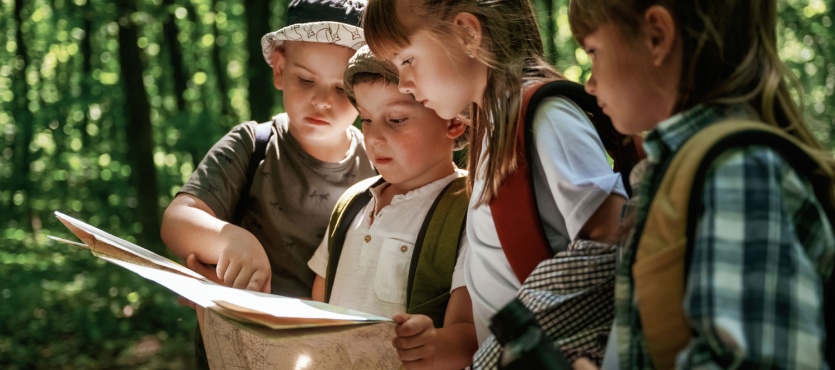In today’s world, many children grow up with limited exposure to the great outdoors. With technology-driven entertainment and structured indoor activities dominating their daily lives, opportunities to develop practical survival skills are often overlooked. However, learning these essential skills can have a lasting impact, helping children build confidence, resilience, and self-sufficiency.
Survival skills taught at camps go far beyond fire-building and navigation. They foster independence, teamwork, and critical thinking, all while encouraging a deeper connection with nature. Whether learning how to purify water, build a shelter, or identify edible plants, these lessons prepare children for outdoor adventures and provide them with valuable life skills that extend well into adulthood.
Building Confidence and Self-Reliance
One of the greatest benefits of learning survival skills is the sense of confidence it instills in children. Mastering outdoor skills like starting a fire without matches, tying essential knots, or setting up a tent gives kids a tangible sense of accomplishment. These experiences teach children that they can problem-solve and overcome challenges on their own, fostering independence.
In an environment where instant solutions are readily available through technology, survival skills help kids reconnect with their ability to think critically and adapt. They learn to trust their instincts, stay calm under pressure, and rely on their knowledge to navigate unfamiliar situations.
Enhancing Problem-Solving and Critical Thinking Skills
Survival training requires logical thinking, adaptability, and creativity. Whether faced with building a sturdy shelter in unexpected weather or finding the best way to purify water, children are encouraged to assess their surroundings, think ahead, and make informed decisions.
These problem-solving skills translate to everyday life. The ability to evaluate risks, work through challenges, and remain calm under pressure is essential not only in outdoor adventures but also in academics, sports, and future careers. Kids who learn to approach problems with confidence and resourcefulness carry these skills into adulthood, making them better equipped to handle life’s uncertainties.
Teamwork and Leadership Development
Survival situations often require teamwork, and camps provide the perfect setting for children to work together toward a common goal. Learning to build a fire, navigate a trail, or construct a shelter as a team teaches communication, cooperation, and leadership skills.
Children quickly learn that working together enhances their success in problem-solving. Some campers naturally take on leadership roles, while others contribute by providing creative solutions or assisting their peers. These collaborative experiences help children develop strong interpersonal skills and the ability to lead and support others in challenging situations.
Fostering Resilience and Adaptability
Survival skills training introduces children to challenges that test their patience, perseverance, and ability to adapt. Unlike controlled environments where conditions are predictable, the outdoors presents ever-changing variables—shifting weather, unexpected obstacles, and limited resources.
By experiencing and overcoming minor setbacks, such as struggling to build a fire in damp conditions or working through a navigation error, children develop resilience. They learn that failure is simply part of the learning process and that persistence leads to success. This mindset helps kids handle setbacks in other areas of life, from academics to personal challenges.
Encouraging a Deeper Connection with Nature
Survival skills help children understand and appreciate the natural world. Learning how to identify edible plants, track wildlife, or filter water from natural sources deepens their awareness of the environment and its resources. These experiences cultivate a lifelong appreciation for nature and promote responsible outdoor practices.
Children who engage in survival training also develop a sense of environmental stewardship. Understanding how to safely interact with nature encourages respect for wildlife, ecosystems, and conservation efforts. Many campers take these lessons home, adopting eco-friendly habits and sharing their knowledge with others.
Practical Skills for Outdoor Adventures and Emergencies
While survival skills are invaluable for outdoor adventures, they also provide practical benefits in emergency situations. Knowing how to start a fire, administer basic first aid, or navigate without GPS can be lifesaving in real-world scenarios.
Children who attend camps with survival training are better prepared for future hiking, camping, or travel experiences. They gain the confidence to explore new environments safely and handle unexpected situations with a level-headed approach.
Preparing Kids for Life’s Challenges
Learning survival skills at camp is about more than just being prepared for the outdoors—it’s about developing confidence, problem-solving abilities, teamwork, and resilience. These essential skills empower children to face challenges with a positive attitude, preparing them for success in all aspects of life.
Camp Live Oak understands that outdoor education provides invaluable life lessons that extend far beyond the camp experience. Our survival skills training helps children build independence, leadership, and a lasting appreciation for nature. To learn more about how your child can benefit from our outdoor programs, visit our contact page.

